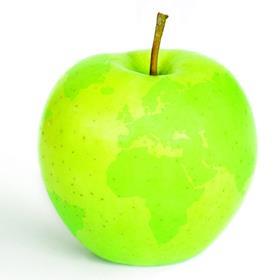
New markets, production, carbon footprints, pesticide residues and eco-sustainability will be on the agenda at a conference entitled The Apple in the World, which is due to take place alongside the international apple industry meeting Interpoma in Bolzano, Italy, on 4-6 November 2010.
The apple is one of the most popular fruits in the world and, in Europe alone, some 11m tonnes of apples were harvested last year.
The 2010 production forecast is for a smaller crop of 9.8m tonnes, with growers anticipating a reduction in volumes compared to the previous year.
In fact, data published during the recent Prognosfruit meeting in Kiev, Ukraine, suggested the 2010 crop will be 11 per cent down on 2009 and 7 per cent below the average for the last three years.
Italian production is set to account for the lion’s share of this total, despite falling by 3 per cent year-on-year to 2.17m tonnes, followed by Poland with 1.98m tonnes (-24 per cent) and France with 1.58m tonnes (-4 per cent).
In terms of varieties, Golden Delicious remains the largest variety across the EU-27 with a predicted crop of 2.43m tonnes, followed by Gala with 1m tonnes and Red Delicious with 663,000 tonnes.
Apples will be the sole focus of Interpoma, the sector’s only international trade fair, which is held every two years at the Fiera Bolzano convention centre.
Sessions at The Apple in the World conference will be coordinated by Kurt Werth, director of the South Tyrol Association for Variety Renewal, and are set to be attended by international experts and speakers who will discuss new scenarios in areas such as marketing, production, food safety and ecological sustainability.
'With wide–ranging topics and high-profile speakers, the international conference on the apple is one of the highlights of Interpoma,' commented Reinhold Marsoner, managing director of Fiera Bolzano.
'Interpoma has always been an exhibition with a strong international focus and has continued to expand its global reach over the years.'
Now approaching its seventh edition, Interpoma has become an essential event for those working in the apple sector, as demonstrated by the growing number of exhibitors and visitors in attendance.
Figures for the last edition, which took place in 2008, speak for themselves: 17,000m2 of exhibition space were visited by 11,653 guests from 57 countries.
This represented a substantial increase on 2006, when the event drew 9,646 visitors.
The number of exhibitors, meanwhile, totalled 280, of whom 205 were Italian and 75 were from 15 overseas countries.
The event's success is set to continue and can be attributed to its specialist nature, explains Kurt Werth. 'Interpoma has become an unmissable event for international experts in the sector, thanks in part to the merging of the trade fair and the conference,' he said.
The legend of the apple
The 2010 edition of the conference will open with an introductory speech on the legend of the apple.
'We felt the need to give the apple the same cultural and philosophical dignity as has been given to wine and viticulture,' confirmed Mr Werth.
'We want to promote a culture of the apple, so that this fruit is no longer perceived solely as a food and a product but also as the symbol of an ancient tradition and history.'
The three-day conference will also provide a forum for discussing production and marketing issues ranging from the new production geography, dominated by certain regions of Russia, Moldova and Ukraine, to new market frontiers, such as countries in North Africa and the Middle East.
Other hot topics will include pesticide residues, carbon footprints and energy balance.
'These have become burning issues,' added Mr Werth, 'as different countries start to impose carbon labelling on products, to certify the quantity of CO2 emitted during production and marketing processes.'
The conference will wrap up with analyses by Isafruit and Interpoma, offering a total of seven separate reports designed to provide an exhaustive overview of the European apple industry.



